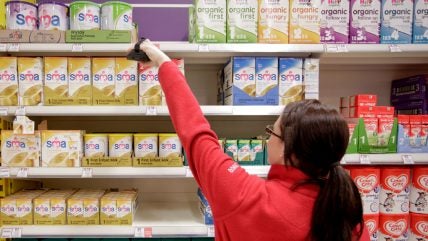
Parents in the UK are “paying over the odds” for baby food, according to the UK’s Competition and Markets Authority (CMA).
In an “interim” report, the UK’s competition watchdog has suggested a series of changes to address concerns about the country’s infant-formula market.

Discover B2B Marketing That Performs
Combine business intelligence and editorial excellence to reach engaged professionals across 36 leading media platforms.
In the report, which follows a market study initiated in February, the CMA said there is “limited competition” on prices and a “lack of timely, clear and impartial information” about infant formula in the UK.
Over the two years from December 2021 to December 2023, prices for infant formula in the UK increased by 18-36%, depending on the brand, the watchdog said,
According to the CMA’s analysis, the “top three manufacturers” account for “90-100%” of supply. The largest manufacturer alone accounted for 50-60% over the first seven months of 2024.
UK parents could potentially save between £300 ($388) and £500 during a baby’s first year by opting for lower-priced infant-formula brands, according to evidence reviewed by the CMA.

US Tariffs are shifting - will you react or anticipate?
Don’t let policy changes catch you off guard. Stay proactive with real-time data and expert analysis.
By GlobalDataFollowing a “deep dive” into the sector, the regulator said it had uncovered unintended consequences of regulations aimed at supporting breastfeeding, which may be inadvertently inflating formula prices.
Strict rules against price promotions and health claims have led companies to employ brand-building strategies the CMA said means it is difficult for parents to make informed comparisons between formulas.
The watchdog said parents were faced with higher prices due to “limited competition”, “brand loyalty, and the essential nature of the product”.
The research conducted by the CMA also argued that parents, especially those in “vulnerable situations”, are not receiving “clear and impartial” information when selecting a formula.
As a consequence, parents can often buy more “expensive” brands under the assumption that a higher price equates to better quality, despite guidance from the UK’s National Health Service that says all infant formula meets the same nutritional standards.
The CMA has proposed several measures to help parents and carers in the UK. These include providing “clear, accurate and impartial information” on formula in healthcare and retail settings and potentially standardising packaging in hospitals to reduce the influence of branding.
Other recommendations include the display of information on the “nutritional sufficiency” of infant-formula in retail settings, clarifying online regulations in the UK and strengthening oversight by national health authorities. The CMA also suggested allowing manufacturers and retailers to be able to “publicise prices and price reductions”.
CMA chief executive Sarah Cardell said: “This is a very important and unique market. We’re concerned that companies don’t compete strongly on price and many parents – who may be choosing infant formula in vulnerable circumstances and without clear information – opt for more expensive products, equating higher costs with better quality for their baby.
“We have identified options for change, but now want to work closely with governments in all parts of the UK, as well as other stakeholders, as we develop our final recommendations.”
The CMA has said that feedback on the report can be submitted by 29 November. It plans to publish its final report on the UK infant-formula market in February.





